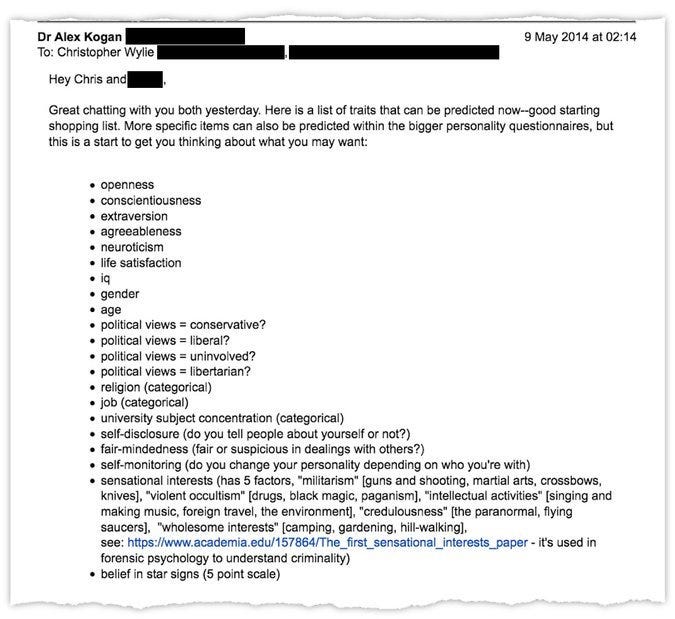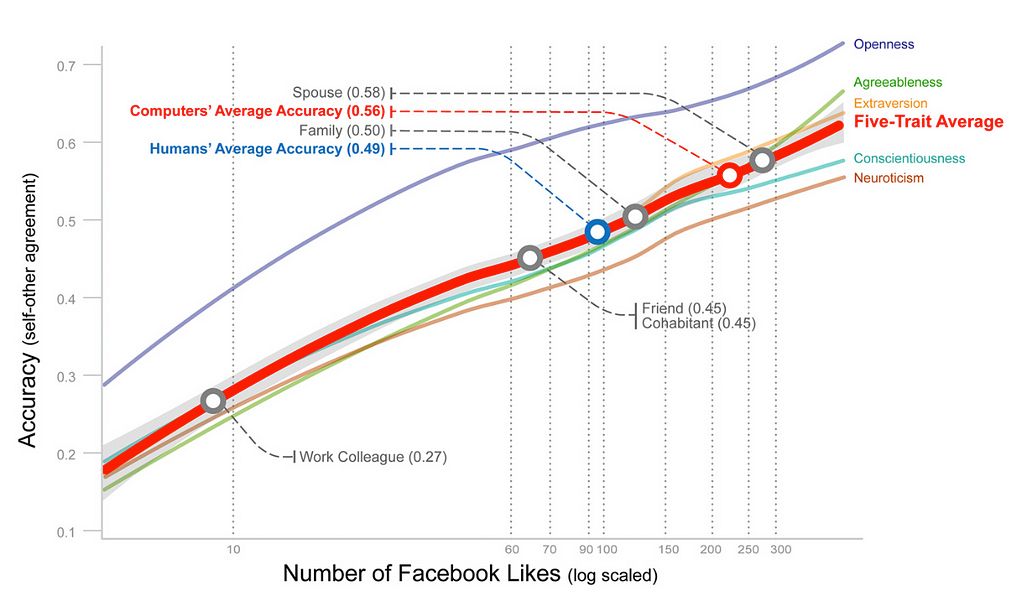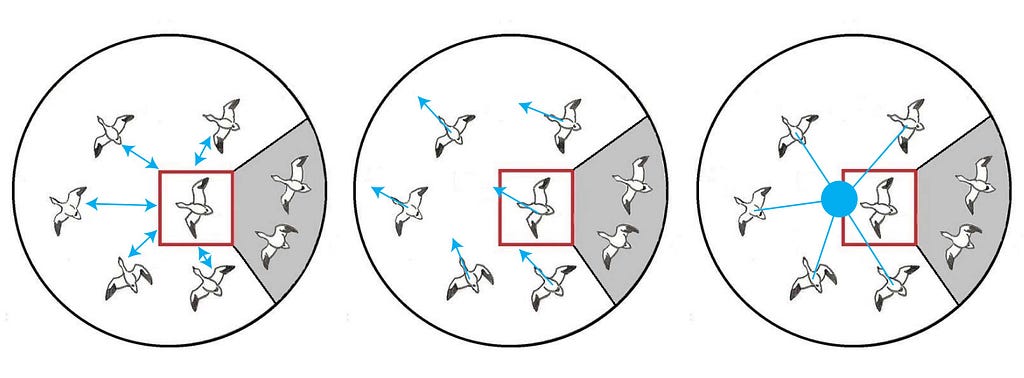Latest news about Bitcoin and all cryptocurrencies. Your daily crypto news habit.
 Manipulating the Full Range of Human Emotions: “We are governed, our minds are molded, our tastes formed, our ideas suggested, largely by men we have never heard of.” — Edward L. Bernays, Propaganda. Image source: Zastavki
Manipulating the Full Range of Human Emotions: “We are governed, our minds are molded, our tastes formed, our ideas suggested, largely by men we have never heard of.” — Edward L. Bernays, Propaganda. Image source: Zastavki
As the proverbial hits the fan about “Steve Bannon’s psychological warfare mindfuck tool,” the lessons we’re learning about humanity’s evolution are great news — if you’re willing to look at the bigger picture. In order to explain what I mean by this, I’m first going to have to spend a few minutes laying out what’s missing from most of the reporting of the Facebook scandal, how society (and specifically democracy) works, how our collective intelligence is evolving and why the emergence of blockchain technologies is perfect timing. Finally, I’ll lay out what — specifically — we can learn about data ownership, data usage and the functioning of a blockchain-driven society.
1. Behind the scenes of the Facebook scandal: the scientific proof
The majority of the #DeleteFacebook reporting revolves around who did/said what to whom and when, whether Trump actually won the 2016 election democratically and what should be done. These existential questions are challenging the very fabric of liberal democracy, and by extension Western civilisation. Key players involved in the controversy include Dr. Aleksandr Kogan, David Stillwell, Christopher Wylie, Alexander Nix, Steve Bannon, Robert Mercer, Andrew Breitbart, Joseph Chancellor, Cambridge Analytica, Strategic Communications Laboratories (SCL), Global Science Research, Renaissance Technologies, Breitbart News, Government Accountability Institute and of course Zuck and Trump.
What is much less frequently reported on is University of Cambridge’s Apply Magic Sauce, a tool which analyses your Facebook and Twitter activity to surprisingly accurately predict your personality and their Discover My Profile series of tests and evaluations. Also largely ignored is the myPersonality Project (more on these tools and research later).
Zuck and Sandberg’s less-than-stellar responses — in which they did not admit fault, nor apologise nor ask for outside help — are disturbing, because they show that either Facebook leadership have no clue as to the ramifications of this event, OR (more likely) they do realise how serious events are but are downplaying it all to avoid a shareholder panic. This story will no doubt unfold over many weeks, months and years to come. However, if you ignore for a moment the drama reported in the media, it behooves us as humanity to delve into some of the research which made the little Facebook/Cambridge Analytica experiment possible.
Let’s start with Dr. Aleksandr Kogan aka Dr. Aleksandr Spectre. You can find his full background here, but briefly he is a University of Cambridge Cognitive and Behavioural Neuroscience researcher and Founder of Philometrics, a survey software platform, where he calls himself Alex Slinger. (Yes, I know, the multiple aliases are a concern.) His academic credentials (taken from a 2014 resume) include:
- Postdoctoral Fellow, Department of Psychology, University of Toronto
- Assistant Professor, Department of Psychology, University of Cambridge, UK
- Director: Cambridge Prosociality and Well-being Laboratory
- Fellow: Well-being Institute
- Theme Champion: Cambridge Big Data
- Affiliated Member: Behavioural and Clinical Neuroscience Institute
He has a B.A. in Psychology from University of California, Berkeley and a Ph.D. in Psychology from University of Hong Kong. He has published or advised on 28 research papers, all with recurring themes like prosocial behaviour (behaviour that is positive, helpful, and intended to promote social acceptance and friendship), positive self-evaluation (the desire to protect the self from negative information), personality differences, influencing and predicting emotions, the emotional ecosystem, motivational theory, and the oxytocin receptor (OXTR). He appears to be an intelligent man and with his academic experience perhaps there’s no-one better suited to understand the motivations and desires of millions — and then be able to use these as a weapon for politicians and corporations in the global battle to influence people.
Two research papers had a big influence on Kogan/Spectre/Slinger:
- Computer-based personality judgments are more accurate than those made by humans — a 2014 joint effort between the Psychology Departments of University of Cambridge and Stanford University, and;
- Sensational interests and general personality traits, Journal of Forensic Psychiatry & Psychology — a 1999 paper which resulted in a Sensational Interests Questionnaire, referenced in one of Kogan’s emails below:
 An email from Dr. Kogan to Mr. Wylie describing traits that could be predicted from Facebook data. Source: New York Times
An email from Dr. Kogan to Mr. Wylie describing traits that could be predicted from Facebook data. Source: New York Times
It was this Sensational Interests Questionnaire which led to the development of the “This is Your Digital Life” Facebook quiz, used to scrape the 50m Facebook records subsequently sold to Cambridge Analytica.
The point is that the Facebook scandal is backed by deep science and psychology, with many research papers backing the methodology. The Facebook scandal is less about data than it is about human psychology.
If you agree that it’s more helpful to understand the psychological reasons for why things have turned out the way they have — rather than following the human and corporate drama unfolding — you might find this brief summary of both papers, upon which Kogan’s work is based, useful.
Summary findings Kogan relied on
- Five types of ‘human judges’ are identified: work colleague, cohabitant or friend, family member, and spouse. These are the individuals who best know you, on an increasingly familiar scale. In other words, work colleagues know the least about what motivates you and a family member (or spouse if you’re in a relationship) knows the most.
- The computer model needed a relatively low number of Facebook Likes to consistently outperform every human judge — work colleague: 10, cohabitant or friend: 70, family member: 150, and spouse: 300.
- Average number of Likes per individual Facebook profile is 227. The model’s accuracy is significantly better than that of an average human judge and comparable with an average spouse, the best of human judges.
- Peak computer performance occurred with participants who had 500 or more Likes.
- Especially high accuracy was observed for openness — a trait known to be humanly hard to judge, because openness is difficult to observe and measure.
Here’s a graph showing the performance of each ‘human judge,’ overlaid with the number of Facebook Likes required to achieve the same level of accuracy:
 Computer-based personality judgment accuracy (y axis), plotted against the number of Likes available for prediction (x axis). The red line represents the average accuracy (correlation) of computers’ judgment across the five personality traits. The five-trait average accuracy of human judgments is positioned onto the computer accuracy curve. For example, the accuracy of an average human individual (r = 0.49) is matched by that of the computer models based on around 90–100 Likes. The computer accuracy curves are smoothed using a LOWESS approach. The gray ribbon represents the 95% CI. Accuracy was averaged using Fisher’s r-to-z transformation. Source.
Computer-based personality judgment accuracy (y axis), plotted against the number of Likes available for prediction (x axis). The red line represents the average accuracy (correlation) of computers’ judgment across the five personality traits. The five-trait average accuracy of human judgments is positioned onto the computer accuracy curve. For example, the accuracy of an average human individual (r = 0.49) is matched by that of the computer models based on around 90–100 Likes. The computer accuracy curves are smoothed using a LOWESS approach. The gray ribbon represents the 95% CI. Accuracy was averaged using Fisher’s r-to-z transformation. Source.
- The model accurately predicted 13 life outcomes and traits previously shown to be related to personality: life satisfaction, depression, political orientation, self-monitoring, impulsivity, values, sensational interests, field of study, substance use, physical health, social network characteristics, and Facebook activities.
- Computer judgment was higher than that of human judges in 12 of the 13 criteria (all except life satisfaction).
- Platforms like Facebook allow anyone to collect personality data without burdening participants with lengthy questionnaires and these datasets can infer their personal characteristics more accurately than their closest family members.
- People use personality judgments to make day-to-day decisions and long-term plans in their personal and professional lives, such as whom to befriend, marry, trust, hire, or elect as president.
- Knowledge of people’s personalities can be used to manipulate and influence them.
The point for now is that the scientific and psychological model underpinning the Facebook scandal is incredibly accurate. When you hear Cambridge Analytica (or anyone else) downplaying how effective your data is at predicting your behaviour, you know that this is at best a half-truth. We now have the science to show that the model of personal data analysis flat out works.
We’ll come back to this topic after we’ve peered down the next rabbit hole.
2. How society (and representative democracy) works
What is unfolding now is nothing new. Manipulation of large groups of people has been a hallmark of modern humanity. The only thing that’s new is how visible the manipulation has become.
Disgraced CEO of Cambridge Analytica may have been suspended for his role in the debacle, but he’s not the first villain to have manipulated opinions. In the early 1900’s, Edward Bernays — an Austrian-American public relations consultant — worked for dozens of major American corporations including Procter & Gamble and General Electric, and for government agencies, politicians, and non-profit organisations. His role was to influence public opinion, and his obituary referred to him as “the father of public relations.” He was named one of the 100 most influential Americans of the 20th century by Life magazine and he was the subject of a full length biography by Larry Tye called The Father of Spin (interview with the author) and later an award-winning 2002 documentary for the BBC by Adam Curtis called The Century of the Self (Part 1, Part 2, Part 3, Part 4). Bernays did for President Calvin Coolidge and Herbert Hoover exactly what Cambridge Analytica did for Trump: rally public support for an unlikely candidate. Bernays created the idea of fashioning a pitch that will appeal to different interest groups.
Bernays’ enlightening 1928 book, Propaganda, (download scanned pdf) explores his thesis that “invisible” people who create knowledge and propaganda rule over the masses, with a monopoly on the power to shape thoughts, values, and citizen response. The following quote from the book succinctly summarises his findings (emphasis added):
“The conscious and intelligent manipulation of the organized habits and opinions of the masses is an important element in democratic society. Those who manipulate this unseen mechanism of society constitute an invisible government which is the true ruling power of our country. …We are governed, our minds are molded, our tastes formed, our ideas suggested, largely by men we have never heard of*. This is a logical result of the way in which our democratic society is organized. Vast numbers of human beings must cooperate in this manner if they are to live together as a smoothly functioning society. …In almost every act of our daily lives, whether in the sphere of politics or business, in our social conduct or our ethical thinking, we are dominated by the relatively small number of persons…who understand the mental processes and social patterns of the masses. It is they who pull the wires which control the public mind.”― Edward L. Bernays, Propaganda
*(Robert Mercer, for example)
In short, government and public-facing elected leaders (including Trump) are not the individuals who influence public opinion. At most they are a distraction: they stir up anger, debate and vitriol so as to keep our attention away from those who are actually steering and informing public opinion.
Manipulation of public opinion has occurred since at least the invention of hot metal typesetting in 1884, which allowed widespread distribution of newspapers. The ability to manipulate public opinion is the reason why newspaper and media companies are so powerful. It’s this principle Jeff Bezos fully understood when he bought WaPo. Steve Bannon fully understood this when he co-founded Cambridge Analytica and Robert Mercer fully understood it when he funded CA. CA understood this principle when they brazenly changed the wording on their homepage from “we use data modeling and psychographic profiling to grow audiences, identify key influencers, and connect with people in ways that move them to action.” to:
“Cambridge Analytica uses data to change audience behavior.” Screen capture from CA’s website, 6 December, 2016
Screen capture from CA’s website, 6 December, 2016 Screen capture from CA’s website, 23 March, 2018.
Screen capture from CA’s website, 23 March, 2018.
Changing audience behaviour is nothing new and is, in fact, the basis of modern advertising. Where it get’s scary, though, is when you want to change the behaviour of an entire society. Listen to Christopher Wylie explain how simple it is to manipulate public opinion using social media, in real-time:
“If you want to fundamentally change society, you first have to break it. It’s only when you break it, when you can remould the pieces into your vision of a new society. This was the weapon that Steve Bannon wanted to build to fight his culture war. “— Christopher Wylie, Cambridge Analytica Researcher and Whistleblower (Guardian Interview, 11:29)
The Facebook scandal is about much more than a data breach — it’s about outright propaganda and it’s about tearing the US and the European Union apart. It’s psychological warfare and it’s why we should be infuriated by Zuck and Sandberg’s responses. Their responses simply don’t adequately reflect the enormity of what we’re dealing with, which Professor Jonathan Albright has detailed in a two-part big data analysis:
- The #Election2016 Micro-Propaganda Machine
- #Election2016: Propaganda-lytics & Weaponized Shadow Trackers
Despite the extent of the propaganda, I still believe the unfolding scandal, which will take many months to fully unpack, is great news for humanity — here’s why.
A significant shift in humanity’s existence (or a system reset, if you prefer) usually only occurs when triggered by a system-wide event. Past triggers that partially changed humanity have included world wars, holocausts and ethnic cleansings, politicides, famine, floods, drought and epidemics. In recent times, many are openly calling for a new political and economic model, reflecting failing trust in the existing system. Others are already building tools to support a new system. However, I’ve often wondered what kind of system-wide trigger would enable the required shift to a new system and whether the trigger could be non-calamitous (let’s try and avoid World War 3 if at all possible). Could the Facebook/Cambridge Analytica Data Scandal of 2018, in hindsight, come to be viewed as the system-wide event that triggered a system reset?
It remains to be seen whether the unfolding scandal will eventually make enough people realise that “representative democracy” is in shambles and mass manipulation has run its course. I remain hopeful, but in order to understand the reason for my optimism, it is necessary to dive down one further rabbit hole.
3. How our collective intelligence is evolving Wild Balkans — Dance of the Starlings. Source
Wild Balkans — Dance of the Starlings. Source
Murmuration, the correct name for flocking starlings, is one of nature’s most extraordinary sights. Just a few hundred birds moving as one is enough to convey a sense of suspended reality, and some — like the one above — consist of thousands of birds in an impossibly-orchestrated scene of pure beauty. Scientists have only relatively recently discovered what makes the uncanny coordination possible, and it turns out that what they’ve discovered about how murmuration — or swarm intelligence — works can be applied to the emergence of complex systems.
At the individual level, the rules guiding this display are relatively simple, and have been summarised by the most famous flocking model, shown diagrammatically below, known as Boids.
 The three flocking rules from the Boids model: 1) Separation; 2) Alignment; and 3) Cohesion. Source.
The three flocking rules from the Boids model: 1) Separation; 2) Alignment; and 3) Cohesion. Source.
This model requires each member of the flock to act based on visual cues as follows:
1) Separation : Give neighbours enough space to fly
2) Alignment: Steer in the same average direction as surrounding neighbours
3) Cohesion: Fly towards the average position of surrounding neighbors as long as rule 1 has been satisfied.
These three rules are the basis for all swarm and insect logic. The rules guide ant colonies, schools of fish and stampeding buffalo. The same three rules are increasingly used in artificial intelligence and drone swarms, like this world record-breaking display at the PyeongChang 2018 Olympics:
These same three rules can also be applied to systems of humans. Examples include spontaneous human organisation into systems like coalitions, political parties, insurgencies and even geographically distributed groups like Generation Y and Generation Z. The same three rules apply to the dissemination of information on social networks, the outbreak of disease and the way it spreads through a population, the spontaneous growth and organisation of cities or urban sprawl and the formation of slums.
OK, you may be saying, but where is all this talk of swarm intelligence going?
One of the unintended consequences of scientific progress is that of reductionism (Elon Musk calls it First Principles): the notion that any complex idea or system can be completely understood in terms of its simpler parts or components. The swarm team at Intel had to learn the limitations of reductionism before they could stun the world with their 2018 Olympics display. The system they built for their first display of 100 drones controlled each drone individually. To get to a 500-drone display, they had to design their system for a single fleet, rather than 500 separate drones. The 1,200 drone display in PyeongChang required only 2 people to operate. The system they built guides the entire fleet, and each drone is controlled by only three rules: Separation, Alignment, Cohesion.
Earlier we said that the three rules of swarm intelligence can be applied to human systems. However, herein lies the problem: all of our systems have been designed around the principle of reductionism: education, politics, economics, healthcare, even religions. We’ve designed systems for a world of railway tracks, when humanity wants to perform like a flock of starlings. Philip Warren Anderson, American physicist and Nobel laureate, understood this when he wrote in 1972 (emphasis added):
“The more the elementary particle physicists tell us about the nature of the fundamental laws, the less relevance they seem to have to the very real problems of the rest of science, much less to those of society.The behaviour of large and complex aggregates of elementary particles, it turns out, is not to be understood in terms of a simple extrapolation of the properties of a few particles. Instead, at each level of complexity entirely new properties appear…..Psychology is not applied biology, nor is biology applied chemistry.Surely there are more levels of organisation between human ethology and DNA than there are between DNA and quantum electrodynamics” — P. W. Anderson, More is Different.
The world today is significantly more complex than the world of 1850 — at the peak of the Industrial Revolution — and yet we rely on the same systems of trade and governance, now more than 200 years old. Democracy and capitalism have had no system upgrade since they first made their appearance. Trying to run a modern society under old systems is the same as the Intel Swarm Team trying to control a swarm of 1,200 drones using 1,200 operators: it simply has no chance of working. We’ve reached a level of complexity where new properties are appearing — properties which cannot be explained by reductionism.
That’s why the emergence of cryptocurrencies and blockchain technologies is so exciting. These technologies allow us to build governance and economic systems with swarm intelligence built in as part of the core design. It may be early days, but after researching by now more than 200 carefully selected blockchain white papers, it’s undeniable that Satoshi’s white paper unleashed an entirely new Zeitgeist: an idea or notion that only makes sense to a relatively small group, but which gains rapid traction.
In a beautifully written and poignant essay, Jordan Greenhall points out that Bitcoin isn’t money or a store of value or a commodity or anything that fits into the paradigm of capitalism. Rather, what makes Bitcoin important is that it represents a new mutation in self-organising collective intelligence. The entire essay is a worthwhile read:
Lets get this straight, Bitcoin is an experiment in self-organizing collective intelligence.
Will my generation achieve a human operating system that supports swarm intelligence? I doubt it. Criticising or replacing the very system responsible for tremendous wealth (the primary way my generation measures success) makes no sense at all. It will be Generation Y or Z that gets this right, and I’m confident they will: it’s in their DNA.
“Blockchain’s future will be determined precisely by the dynamic tension between the problems it faces and its capacity to solve those problems.” — Jordan Greenhall4. The timing of the emergence of blockchain technologies
Industrial civilisation is in danger and the signs are everywhere: the threat of nuclear war, resource depletion, economic decline, ecological crises, and sociopolitical disintegration. As frightening as the idea of societal collapse may be, collapse is a recurrent feature of human societies: the Harappan Civilisation, Mesopotamia, the Egyptian Old Kingdom, the Hittite Empire, the Minoan Civilisation, the Mycenaean Civilisation, the Western Roman Empire, the Olmec, the Mayan Civilisation…
“The reason why complex societies disintegrate is of vital importance to every member of one, and today that includes nearly the entire world population.” — Joseph A. Tainter, The Collapse of Complex Societies
The British historian Arnold J. Toynbee, in his 12-volume magnum opus A Study of History (1961), theorised that all civilisations pass through several distinct stages: genesis, growth, time of troubles, universal state, and disintegration. Jared Diamond, in his book Collapse: How Societies Choose to Fail or Succeed, proposes five interconnected causes of collapse that may reinforce each other: non-sustainable exploitation of resources, climate changes, diminishing support from friendly societies, hostile neighbours, and inappropriate attitudes for change. Joseph Tainter, in his book The Collapse of Complex Societies, proposes that collapse ultimately comes from diminishing investments in social complexity, which means how invested we are in solving complex social problems. (Today’s equivalent is the increasing concentration of wealth among the 1%, instead of an investment in solving humanity’s super wicked problems). Andrew Lawrence’s Skyscraper Index has shown that business cycles and skyscraper construction correlate. In other words, recessions often follow completion or near-completion of the world’s tallest building.
Whichever metric or model sits most comfortably, there is wide-scale agreement that our current trajectory cannot be sustained for much longer. I’m excited about blockchain because, in the context of “investment in social complexity,” cryptocurrencies and the underlying blockchain technologies represent a massive, planetary-scale investment in new properties emerging as a result of an increase in complexity (like swarm intelligence). As at today, that investment exceeds $400bn market capitalisation, a non-trivial number.
It is still very early days in the decentralisation movement, but it is already proving to be a viable and more likely of two potential outcomes for the destiny of humanity. Facebook’s scandal is simply a nudge towards a fully decentralised world. And for that I’m extremely grateful.
Coming Soon
Part 2, in which we explore data ownership and data usage in a blockchain-driven world.
Society 4.0
I’m tracking the emergence of what we’re calling Society 4.0, until we find a better name. Want infrequent updates (usually about every 3 months)?
Three of my most popular posts
- Project 2030: A Radical Plan to Solve Global Challenges with Emerging, Distributed Technology
- Hi, I’m Gracey. Let me tell you about your future.
- Co-Creating Society 4.0 — Our Only Hope for a Bright New Future
Thanks for reading!
Why Facebook/Cambridge Analytica’s Data Scandal is Awesome News for Humanity was originally published in Hacker Noon on Medium, where people are continuing the conversation by highlighting and responding to this story.
Disclaimer
The views and opinions expressed in this article are solely those of the authors and do not reflect the views of Bitcoin Insider. Every investment and trading move involves risk - this is especially true for cryptocurrencies given their volatility. We strongly advise our readers to conduct their own research when making a decision.